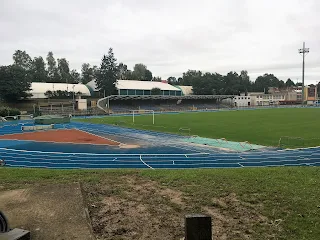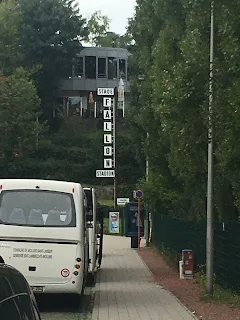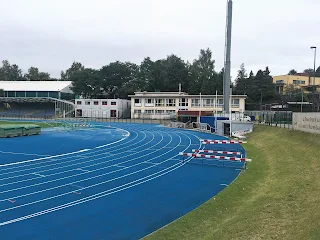The images on this page are of Léopold's time as a tenant at Stade Fallon.
R. Léopold FC is a football club who were formed on February 11th 1893, making them one of the oldest in Belgium. Originally from the district of Uccle, the club relocated to Woluwe-Saint-Lambert in the capital during a long and complicated history.
The club was formed by a dozen enthusiasts, one of whom was Capitaine Reyntiens, leading to the club being named after His Majesty King Leopold II, the monarch of the day. Léopold Club de Bruxelles became the club title, initially playing matches at Ten Bosch in Ixelles.
Léopold took part in the very first Belgian championship, Coupe de Championnat in 1895, as one of ten founder members of the UBSSA. At the time, the game was one played by the nobility rather than the working classes. Léopold were the epitome of this generalisation.
In 1900, Léopold, along with the University of Brussels, provided the players for Belgium to field a football team in the 1900 Olympic Games. A year later, the club moved to a new venue, Parc Bruggman in Uccle, as the team played domestically in Division d'Honneur.
In 1921, the club name was amended to Royal Léopold Club de Bruxelles as the side played in the third national level, which was called ‘Promotion’ between 1931 and 1933. A further appearance followed for the 1950-51 campaign, before Léopold dropped to the newly created Fourth Division.
The club changed its name once again, to Royal Léopold FC, in 1952 and moved to the new ground at Chaussée de Neerstalle at the same time. Two years later, the club dropped down to Brabant Provincial football.
Twenty years later, a series of complicated mergers involving the club would commence. In 1982, Léopold joined forces with Cercle Sporting Racing Uccle to form Royal Léopold Football Club of Uccle. In July 1990, form Royal Léopold Football Club of Uccle merged with Royal Uccle Sport to become Royal Uccle- Léopold Football Club.
Another change came in July 1996. This time, Royal Uccle- Léopold Football Club amalgamated with Royal Cercle Sportif La Forestoise to form Royal Uccle-Forestoise-Léopold Football Club. In July 2001, Royal Uccle-Forestoise- Léopold Football Club merged with Royal Cercle Sportif Saint-Josse to form Royal Uccle-Forestoise Léopold Football Club.
This arrangement led to the formation of a new club, FC Saint-Josse, to play provincial football, which can be read about here. In the 2002-03 campaign, Léopold spent a single season in one of the national Fourth Divisions before returning to regional competition. The team returned in 2004-05 before being relegated once again three seasons later.
In the summer of 2005, the club changed title once again; this time to Royal Léopold Uccle FC, going on to be crowned champions of the Brabant 1ère Provinciale in 2009-10 and won promotion once again, where they consolidated their position in the lower grade of national football; the ‘Promotion’.
At the end of the 2012-13 season, the club management made a major decision to relocate the club. They had become upset by the lack of support for the team from the people of Uccle and having to share Chausée de Neerstalle with various other sports clubs.
The move took the club’s first team to the other side of the city to Stade Fallon in Woluwe-Saint-Lambert. To reflect the change, the club altered their name to Royal Léopold Uccle Woluwe FC.
The team continued to perform in the Promotion fourth division, before that league was renamed the Belgian Third Amateur Division from 2017-18, where they narrowly finished above the relegation zone. CS Onhaye ended any hopes of promotion in the playoffs the following season.
The 2019-20 season ended in relegation back to the now sixth-tier 1 Provinciale Brabant, as the club took up tenancy at Complexe Sportif de Neerstalle, where Georges Sakalis led Le Léo to the title as Khalid Es-Sadiki and Mohamed Vall El Kory scored the goals. Placed in ACFF A, the team went straight back down.
Sébastien Conté was managing the side by the end of the following campaign. This saw some games played at Centre Sportif des Croix de Guerre as well as Complexe Sportif de Neerstalle, which was another one of struggle, managed by Dimitri Leurquin.
My visit
Monday 21st August 2017
My football adventures in Belgium were nearing the end after I caught a couple of buses from the Stade Communal d'Evre Georges Petre, home of FC Saint-Josse, towards Stade Fallon in the Woluwe-Saint-Lambert district of Brussels.
The number 28 bus dropped me a minute or so away from the impressive arena. The top entrance normally used for away fans on football days was open to give me an excellent view and to take my photos.
It appeared that there was some sort of community day for local youngsters taking place, with the track and playground beyond in use, while a group came through the woodland at the side of the stadium after a nature walk.
Stade Fallon's best feature was the impressive full-length seated stand down one side. The opposite side had a natural grass bank, with two modern low-seated stands on top of the slope. There were no spectator facilities behind the curves, but the complex had several other pitches behind the east end.
Once complete with my tasks, I went walking along Chaussée de Stockel to eventually come to the home of provincial club ROFC Stockel.











No comments:
Post a Comment